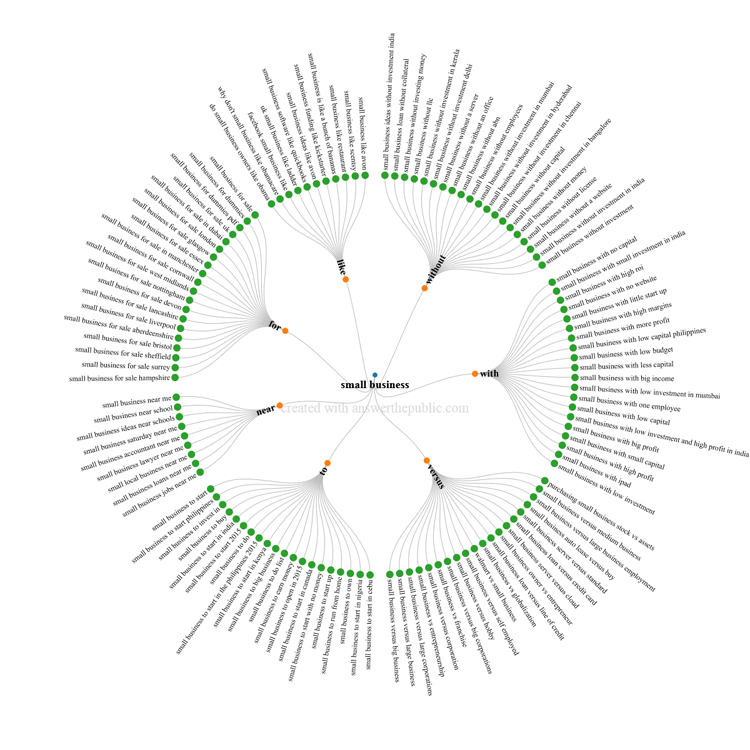Answer the Public is a keyword research tool that helps users discover topics, trends, insights, questions and phrases people are searching for online.
Let me introduce you to a cool search query data visualisation tool called Answer The Public. It fetches and maps keyword suggestions/predictions that you see when you perform a Google search.
Enter a keyword in Answer The Public and you’ll be presented with questions, prepositions and alphabetical lists in graphical form offering insights into the topics, trends, and concerns that are relevant to a particular keyword or topic.
It is part of the semantic search we’re seeing more of as machine learning takes precedence online.
Question Based Keywords
The first data set is 8 question modifiers prefixed to the beginning of the key phrase followed by the Google search suggestion keywords.
The question modifiers are:
- Which..?
- Who..?
- What..?
- When..?
- Why..?
- How..?
- Are..?
- Where..?
I performed a search for “small business” questions and saw results that included:
- Which small business credit card is best?
- Who is the best small business bank?
- What small business to start from home?
- When to register small business?
- Why small business need a website?
- How small business become big?
- Are small business loans easy to get?
- Where to get small business funding?
Preposition Based Keywords
The first data set is 8 question modifiers prefixed to the beginning of the key phrase followed by the Google search suggestion keywords.
The question prepositions are:
- For
- Like
- Without
- With
- Versus
- To
- Near
The “small business” prepositions query returned results including:
- Small business for sale uk
- Small business funding like kickstarter
- A small business loan without collateral
- Small business with no website
- Walmart versus small business
- Small business to earn money
- Small business Saturday near me
Alphabetical List Keywords
Finally, there are 26 lists of alphabetically ordered results related to your keyword search.
While these are useful, some of them can be difficult to understand outside of a meaningful context so I suggest you look them up online and find out what some of the more cryptic phrases actually mean.
Alphabetical lists about “small business”.
What Are the Benefits of Answer The Public?
If you’re looking for ideas about content creation topics, this tool provides the cues you need to start thinking about particular subjects.
Once you’ve generated lists of topics, you could begin drilling down these keywords in a competitive keyword analysis tool like Long Tail Pro, SEM Rush, Google Keyword Planner etc.
Word of warning: Rand Fishkin of Moz documented some concerns in his article Google Keyword Planner hides data?! Crazy.
Yes, it seems Google Ads encourage webmasters to bid on the more expensive keywords instead of truthfully presenting real search volume on of other keywords.
ATP offers up autosuggest data from Bing and Amazon as well, which might fill in some of the gaps.
Understanding Your Audience
Now, make no mistake – some of the keyword questions will be completely irrelevant. There is a lot of manual sifting required to shortlist the queries.
This data can give you inspiration for the content you product. If you can answer FAQs or address concerns an audience has about things related to your products/services.




Lovely post.
Just one point: why we need Answerthepublic if we have free search suggestion from sg.serpstat.com, which is way bigger in dbs?
I hadn’t heard of that one. Thanks for bringing it up!
Heeey! I really liked your post, I think is a great tool and I share all your thoughts, thanks for the tutorial!
Thanks for tutorial! I want to share my own experience of using Answer the Public – I wasn’t satisfied with the amount of suggestions, so I started to looking for another way of content idea results. And I found the best alternative – Kparser – https://kparser.com/answer-the-public-alternative/ it has more sources for keyword research. I also use filters and sorting. With the help of Kparser I expanded semantic core on my pages. Highly recommend this tool!
Have you tried it?
Never heard of it until now – checking it out
Answer The Public is a very strong and great tool. Our tool is much smaller, but can add value to the Answer the Public results: we are able to show you related questions that do NOT contain your keyword. Feel free to have a look at it: faq.directory